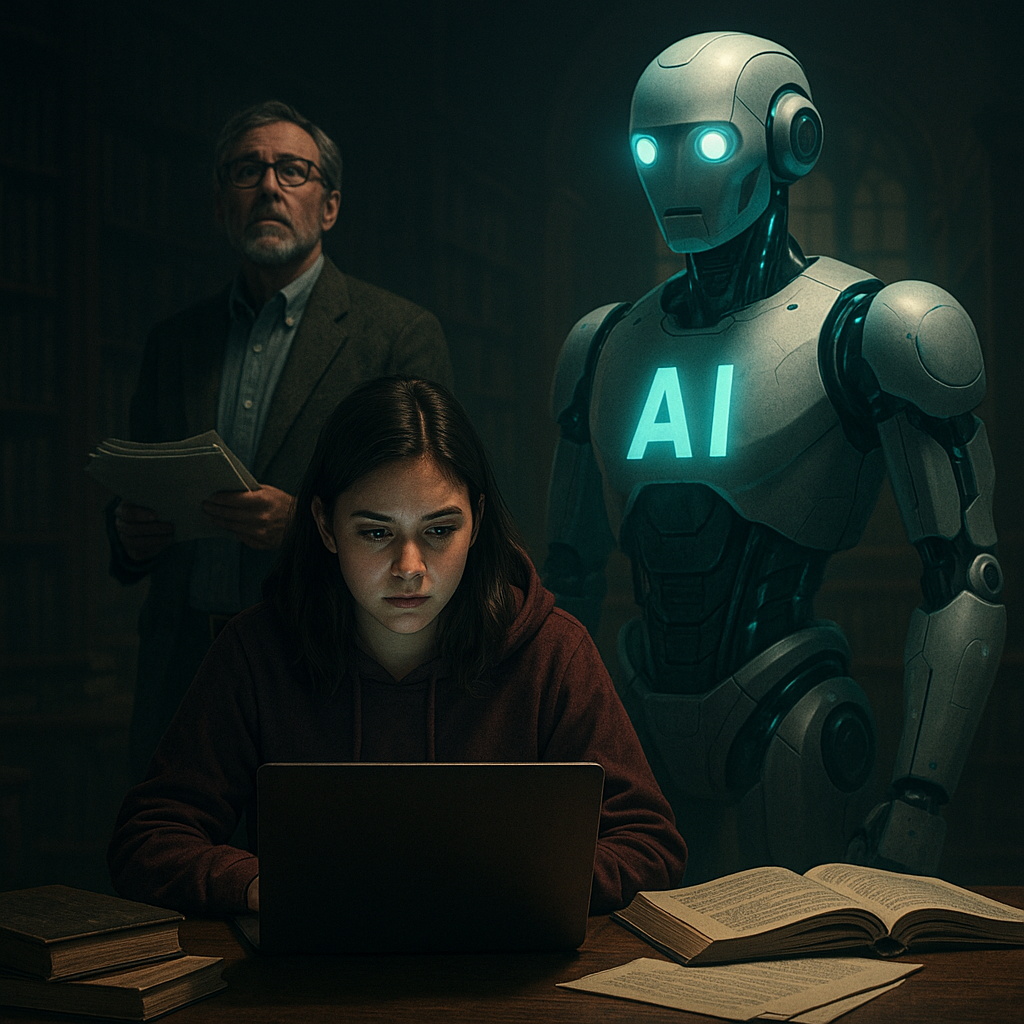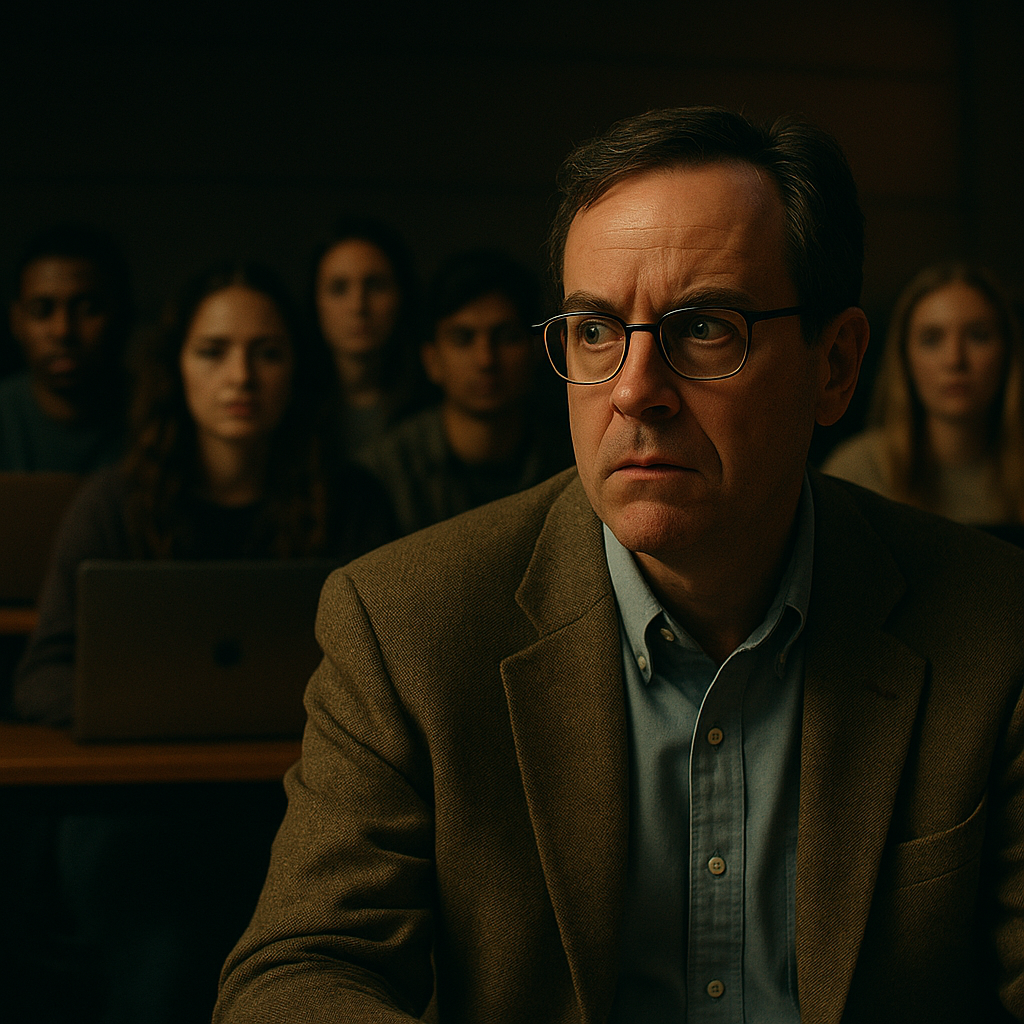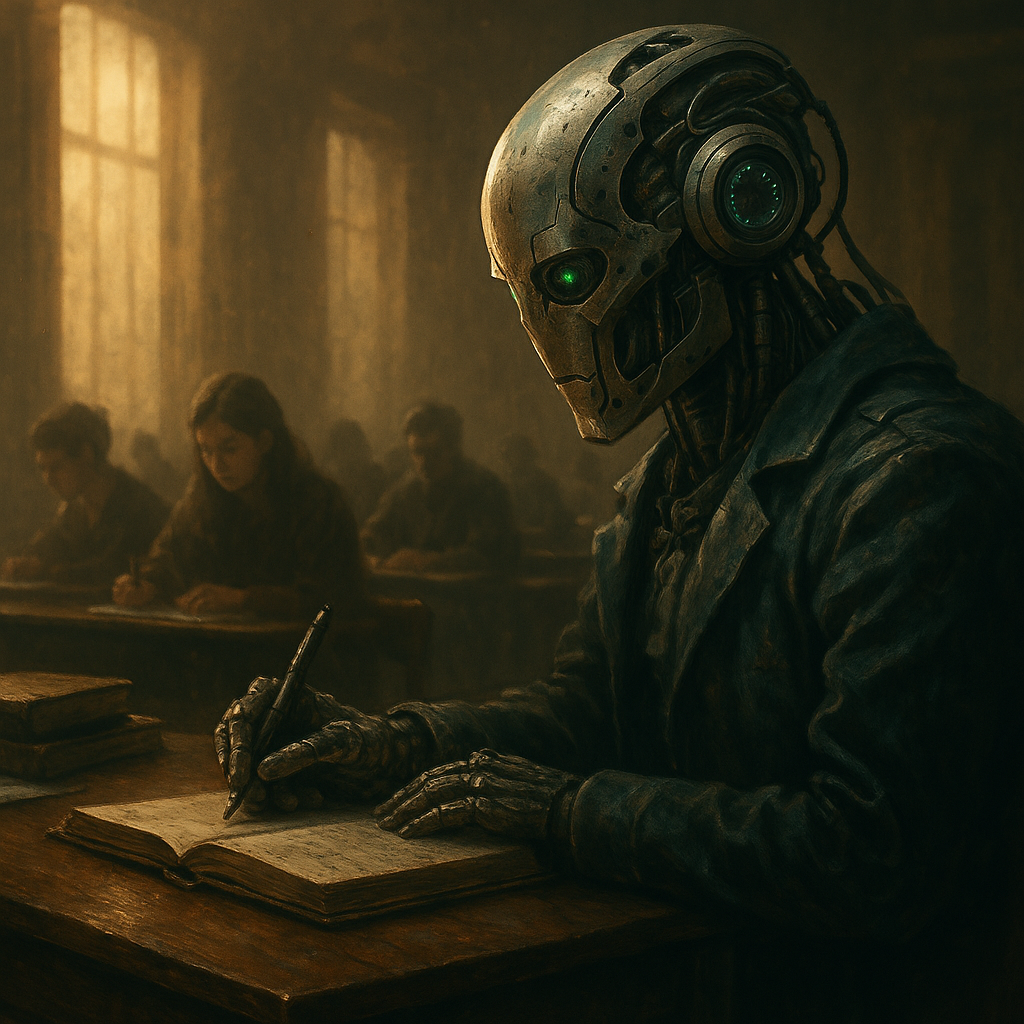
Is AI Making Professors Obsolete?
You're no longer being taught by your professor; instead, you're receiving instruction from ChatGPT. While universities pretend all is well, 92% of students are already using AI tools. Not 50%. Not 75%. Ninety-two percent. Students who use ChatGPT with fictitious Professor personas rated ChatGPT as being clearer and more competent than real Professors.
Let’s cut through the educational theatrics and confront reality. What is actually happening in classrooms across the world? Professors hold on tight to their tenure and administrators count their dollars in tuition but students have already voted with their keyboards.
The Numbers Don't Lie (Even If Your Professor Does).
Here's what the ivory tower doesn't want you to know: A massive 2025 meta-analysis from Nature examining 51 experimental studies found ChatGPT produces a large positive effect on learning performance (g = 0.867). Translation? Students learn better with AI than without it.
According to a report by Digital Education Council, Global Survey 2025, 86% students globally use AI for studies, with 54% using AI weekly and one in four using it daily. Your professor? The handouts were still photocopied in 1987.
But here’s the kicker: When university researchers had students rate both ChatGPT (acting as a professor) and their actual professors, ChatGPT had the upper hand in teaching clarity and teaching competence. The machine beyond any doubt outperformed the human at the one task experts deem impossible.
The Great Academic Delusion
Universities want you to think professors are crucial knowledge gatekeepers. Let’s be real: they're overpaid teaching assistants for an AI that works 24/7 and does not need a $200k salary.
What Students Actually Do vs. What Professors Think They Do
Students are using AI for:
- Searching for information quicker than any prof can give.
- Explaining complex concepts more clearly than lectures.
- Making first drafts that more structured than most under-grads.
- Asking for research proposals (more original than regorgetting same topics)
- Make it more attractive with better grammar and even better writing (at least than the TA’s feedback).
Meanwhile, professors are:
- Prohibiting AI (even though 88 percent of our faculty acknowledges that they are not very familiar with it).
- Detection tools that flag more false positives than a pregnancy test at a monastery.
- Designing an assignment that AI can't answer - impossible
- They grumble about cheating while using AI to do their own research.
A survey conducted by the American Association of University Professors found that 81% of faculty are compelled to use technological systems involving AI but only 17% consider themselves advanced users of AI. They're teaching you about tools they don't understand.
The Uncomfortable Truth About Learning Performance
Let's talk about what actually works. The meta-analysis published in Computers & Education shows ChatGPT doesn't just marginally improve learning—it transforms it.
- Academic performance: Significantly improved.
- Higher-order thinking improved in a more effective way.
- Little work is required of the brain so that you learn with less effort.
- Students are actually interested to learn.
When you compare that to what normally happens in a lecture theatre - a professor reading PowerPoints to 300 students, half of whom are on TikTok. Which one's obsolete?
The best learning occurs in real-life, problem-based contexts where chatGPT serves as an intelligent tutor—always available, infinitely patient, never patronizing. Your professor? Office hours are Tuesday, 2-3 PM, if they show up.
Why Professors Are Running Scared
The unspoken truth is this: it’s not about quality education. It's about job security.
The AAUP survey revealed faculty's real concerns.
- Eight-out-of-ten worry about pay and security.
- Almost half of responders claim AI threatens academic freedom.
- 76 percent of people are less enthusiastic about their jobs now
They're not worried about your education. They're worried about their mortgages.
The "Human Touch" Myth.
Professors love to say that they offer a thing that AI can’t provide, the human element.
What professors claim they provide:.
-
Professors don't know enough of their students to be effective.
-
Paraphrase this (10 words):
-
Nurturing critical thinking while utilizing same slides for 15 years.
-
Gave constructive feedback by returning papers three weeks later with a B+ grade.
-
I have not been out of realism since 1992.
What AI actually provides:.
- 24/7 availability.
- Instant, detailed feedback.
- Personalized learning paths.
- Get real-time updates from around the world.
- Zero judgment, infinite patience.

The Revolution Is Already Here (You're Just Not Being Told)
While universities are busy with setting up "AI policies," students have already changed learning. They're using Ryne AI humanizer to write better, research deeper, and learn faster than any previous generation.
The New Learning Reality
Smart students are not opting between AI or professors but using AI to compensate for bad teachers. Students are getting instant explanations for concepts professors rush through, generating practice problems professors don’t provide, and receiving feedback professors are too busy to give.
Think about it: You’re paying $50,000 a year for education and your best teacher is free software. The scam here is not AI but the institution that is charging you premium prices for a substandard discount education.
What Actually Works
Based on research, students using AI tools like ChatGPT see the biggest improvements when.
- For 4-8 weeks, you’ll see a consistent user experience.
- It’s integrated with problem-based learning.
- Students use it for tasks that can’t be done quickly.
- They combine help from AI with critical evaluation.
Notice what's missing? A professor standing at a podium.
The Skills Gap Nobody's Talking About
The actual joke is that only 42% of students believe that professors are capable of handling AI. The professor doesn’t understand the future they are together teaching using the tools of the past.
In the meantime, 58% students admit they are not well-versed in AI for work. Why? Most universities are wasting your time by resisting AI instead of teaching you how to leverage it.
The Equity Excuse
Universities say they’re “protecting” disadvantaged students from AI inequality. Truth: They’re hoarding the resources that could equalize the game. A student with Ryne's humanizer can produce graduate-level writing regardless of their background. That terrifies institutions built on exclusivity.
How to Win While They Whine
Stop waiting for permission. While professors debate AI ethics, you should be learning AI execution. Here's your playbook.
- Master the Tools, Don't Hide Them.
Use AI openly and strategically. Document your process. Show your work. Never give them an opportunity to accuse you of "cheating" while using 21st-century solutions for a 21st-century problem.
- Demand Better or Do It Yourself.
Your professor is unclear? ChatGPT will clear that up! If they won't provide practice problems, AI will. AI can help you gain instant feedback if the assessment takes three weeks to get graded. You aren’t replacing education you are supplementing insufficient teaching.
- Focus on What AI Can't Do (Yet).
Let AI do the work that is dull so you can focus on the exciting. Use it to draft your copy first and spend time fine-tuning your argument. Let it explain the basics so you can explore the advanced. This isn't cheating—it's efficiency.
- Document Everything.
When you use AI tools like Ryne, keep records. Show how you transformed AI suggestions into original work. Make your process transparent. Turn their paranoia into your advantage.
The Future Is Already Written (By AI)
Let's be brutally honest about where this is heading:
In 5 years:.
- Every course will have Artificial Intelligence tutors.
- Going to class will be optional (it already basically is).
- Your work will assume the use of an AI.
- Professors will be learning facilitators (essentially unemployed).
In 10 years:.
- A specialized AI education will top any university.
- Skill-based credentialing will be done.
- Regular universities will cater to the rentier class.
- Most teachers will be AI avatars.
Today:.
- AI is better at teaching than most poor quality professors and educators.
- Using AI assistant you can write, research, and learn faster.
- You can access tools like Ryne's humanizer to ensure your work passes any scrutiny.
- You can gear up with AI while universities become irrelevant for modern education.
The Bottom Line
Professors are not becoming outdated; rather they are making themselves outdated. The refusal to adapt but instead retaliate, the restriction and not the enabling, the fearing and not the embracing, is essentially signing their own pink slip.
AI helps students learning according to study Students using AI are succeeding more, thinking more deeply, and engaging more. You have a choice. You can wait for someone to tell you what to do about your education. Or you can take the freedom and create it for yourself.
You don’t need your professor’s permission to join the AI revolution even if they are not ready for it. While they're debating whether ChatGPT counts as "cheating," you should be using every tool available—including Ryne's suite of AI-powered academic tools—to demolish the competition.
But here's the bottom line: The students who master AI will never need to worry that the professors will become useless. They'll be too busy succeeding to care.
Take Action or Get Left Behind
Stop following rules that don’t apply in the game, written by people who don’t play it. The academic system isn't going to reform itself. Students are going to disrupt it, when they will not accept humans doing mediocre teaching, when there are better AIs.
Want to write better? Use AI. Want to research faster? Use AI. Want to learn deeper? Use AI. Want to ensure your work is undetectable? Use Ryne's humanizer.
The revolution isn't coming. It's here. When you delay taking action waiting for your professor's permission, your competition is getting ahead of you.
Welcome to the future of education. Your professor's not invited.

Why Elite Private Schools Embrace AI While Public Schools Restrict It?
Here's what your college counselor won't tell you: while public schools are locking down ChatGPT like it's digital contraband, elite private schools are handing out AI tools like candy at orientation. The education gap isn't just widening—it's becoming a canyon, and the bridge costs $50,000 a year in tuition. This isn't about whether AI is good or bad for education. That debate is already over. The winners have been decided, and they're sitting in classrooms where Phillips Exeter Academy students build AI models for their senior projects while public school kids get detention for asking ChatGPT a homework question.

The AI Homework Dilemma
Everyone knows the homework game is broken. Students pretend to do it. Teachers pretend to grade it. Parents pretend their kids aren't using ChatGPT. We’re all playing roles in an educational theater and AI just opened the curtains. Students have started using artificial intelligence for their homework assignments. In fact, 89% of students do. That's not a typo. Almost 90 percent of students have learned what every clever operator knows: work smarter, not harder. For all the academic nuances around “academic integrity” by the educators, the students are many steps ahead, using technologies which make homework as obsolete as a typewriter for code.

